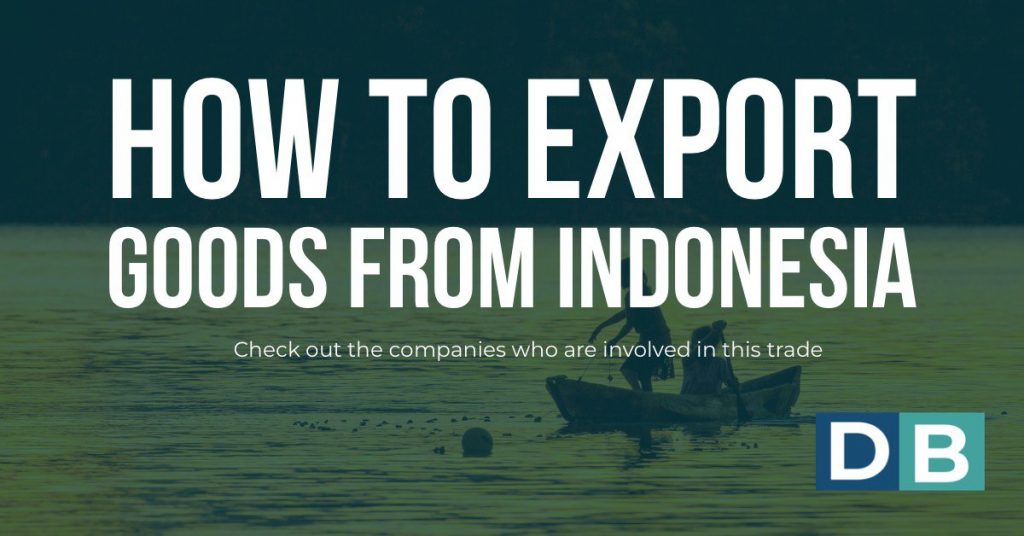How to export Goods from Indonesia
The Companies in Indonesia, whether local or foreign-owned (PMAs), seeking to send their goods abroad are subject to a set of defined export procedures. Before an Indonesian company can export its products, it needs to make sure it meets all Indonesian export requirements.
Requirements for all Indonesian Exporters
In order to carry out exporting activities, a company must already have a taxpayer identification number (NPWP) and one of the following business licenses:
- Trade license (SIUP) from the Ministry of Trade.
- Manufacturing license from the Ministry of Industry, or other licenses issued by the relevant authority.
- PMA license issued by the Investment Coordinating Board (BKPM).
- Exporter identification number (APE).
Prospective exporters should also first determine the export eligibility of the goods in question and the specific regulations that may apply to them in Indonesia as well as in the country of destination. For instance; Minister of Trade Regulation No. 97/M-DAG/PER/12/2014 on Export Provisions for Forestry Products lays out the industry-specific product types allowed for export (namely processed wood products and derivatives, and finished rattan products), matters pertaining to listed exporters, the relevant technical bodies, as well as various procedures and required documents. In general, there may be a quota restriction, a prohibition, or a regulated condition imposed for certain types of goods.
Export Declaration (PEB)
When the availability of a buyer, the payment system (Consignment, L/C, etc.), and the eligibility of the goods have been confirmed, a prospective exporter can proceed with the packaging and scheduling of the shipment. One of the most important steps that comes next is for the exporter to submit a Pemberitahuan Ekspor Barang (PEB) to the Customs and Excise Office. The PEB along with several accompanying documents, including an invoice, packing list, and documents from the relevant technical bodies, are required in order to obtain the final export approval. A PEB will contain information such as:
- Exporter;
- Recipient;
- Customs broker (if available);
- Means of transport;
- Country of destination; and
- The goods (type, quantity, container number, relevant documents).
The PEB must be submitted no earlier than seven days prior to the export schedule or no later than the moment the goods enter the customs area. After due examination on the eligibility of both the exporter and the products, as well as on document completeness and validity, and the PEB has been found valid, the exporter will be granted a notice of export approval (NPE). The issuance of an NPE effectively classifies the goods as goods cleared for export, therefore it can be loaded to the mode of transportation.
It should be noted that in the event that certain taxes are levied on the goods intended for export, the exporter must pay the full amount prior to loading the cargo for shipment. The main component for tax calculations in this regard is the export benchmark price (HPE) as regulated by the Ministry of Trade.
Export Financing
The Indonesian government has established two state-owned companies to function as financial service providers for companies seeking to export their goods; Lembaga Pembiayaan Ekspor Indonesia (LPEI), also called Indonesia Eximbank, for financing needs, and Asuransi Ekspor Indonesia for risk management. Furthermore, there are two main types of export financing:
- Pre-shipment financing which includes Import for Export Purpose, and Export Working Capital.
- Post-shipment financing which includes Export Receivables Negotiation, Export Receivables Discounting, Forfaiting, Factoring, and Banker Acceptance.
Physical Inspection
Regulation dictates a mandatory physical inspection for export-bound goods categorised as:
- Export goods for future re-import.
- Export goods which upon re-import are intended for future re-export.
- Export goods which upon re-import are intended for processing, assembling, or installation on other goods while having obtained import duty exemptions or refunds.
- Export goods with levied duties.
- Export goods which upon information from the Directorate General of Taxation are strongly indicated to potentially violate or have violated applicable regulations regarding taxation.
- Export goods which based on an analysis of information obtained from other sources are indicated to potentially violate or have violated applicable laws.
Legal Consequences
Unlawful violations of the PEB provisions can lead to a number of legal consequences;
- Export activities without submitting a PEB are punishable by a prison sentence of 1-10 years and a fine of 50 million-5 billion IDR.
- Falsified or untruthful PEBs are punishable to 2-8 years in prison and a fine of 100 million-5 billion IDR.
- Late or failure to report the cancellation of an export activity is subject to an administrative fine of 5 million IDR.
- Providing incorrect information about the type and/or quantity of the exported goods is subject to a fine of 100-1,000% of unpaid export levy.
Want to obtain more information?
Info If you want to get detailed information to know who the companies have been involved; analyze the monthly behavior of the products; if you want personalized assistance for your business; You can write to sales@imexdbusiness.com or datasourcing@imexdbusiness.com
Our team will be at your disposal to determine the best strategy for your business!
If you want to analyze a particular product for more than 50 countries; Check your example for free at http://search.imexdbusiness.com/
